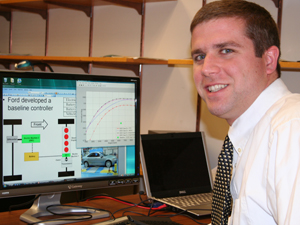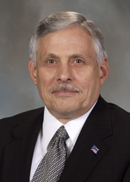Ford, U of M explore new ways to speed development of future hybrid vehicles
“The main goal of this project,” explained Opila, “is to bring advanced methods to HEV and plug-in HEV design.”

 Enlarge
Enlarge
Prof. Jessy Grizzle is applying his expertise in control theory to hybrid electric vehicles in a partnership with Ford Motor Company, and finding ways to improve fuel economy while allowing for optimal driving experiences.
“If you just optimize for fuel economy in a hybrid, you get a car that would be very unsettling to drive,” said Jessy Grizzle, the Jerry W. and Carol L. Levin Professor of Engineering in the U-M Department of Electrical Engineering and Computer Science.
“The car would constantly change gears and engine speed to save minute quantities of fuel” Grizzle explained. “It would not be a pleasant experience.”
The new technology has already been tested with 2,500 road trips, and the data is being analyzed to determine how internal electronic vehicle controls could be tweaked to further improve fuel efficiency and fun-to-drive attributes.

 Enlarge
Enlarge
In addition to the road trips, nearly 1 million controller design simulations of hybrid vehicle control systems have been tested to date, and the pace continues at about 50,000 a week – a development that allows a much more complete exploration of design tradeofffs than has ever been possible in the past.
Prof. Grizzle is quick to credit collaborator Daniel Opila, a mechanical engineering doctoral student, for his major contributions to the research.
“The main goal of this project,” explained Opila, “is to bring advanced methods to HEV and plug-in HEV design. Most academic control methods work well in simulation but do not incorporate the many constraints required for a production car. By developing a controller design method that can incorporate many different goals for vehicle behavior, state-of-the-art optimal control methods can be used to develop real cars that consumers want. My work attempts to bridge the gap between theoretical proofs and the practical requirements of engineers designing the hybrids of tomorrow. This research allows improvements in fuel economy, but more importantly, it is automatic and fast. This really helps when a manufacturer is designing a new vehicle; controllers for that vehicle can be developed in days rather than months.”
Dan came to Michigan from Orbital Sciences Corporation; he earned his bachelor’s and master’s degrees in mechanical engineering at MIT in 2002 and 2003. Grizzle recruited Opila during one of his courses to work specifically on the HEV project. “It combined all the things I wanted,” stated Opila, “theory, an interesting application, and the chance to test in hardware and compare against industrial benchmarks. Energy issues are the biggest problem facing the world today, and I wanted to tackle an important problem.”

 Enlarge
Enlarge
The research is being conducted as a Ford-UM Alliance Project. Mr. Jeffrey Cook, former Technical Leader at the Ford Scientific Research Laboratory, initiated the original HEV project between U-M and Ford, having been familiar with Prof. Grizzle’s work in the past. The seeds for the methods being used were sown in earlier work sponsored by NSF.
Cook has held appointments in the department as an adjunct research professor, and as a lecturer. In recent years, he has provided valuable expertise and industrial perspective as an instructor of the senior undergraduate course, Embedded Control Systems.
Original Press Release by U-M and Ford Motor Company was widely reported, including:
Reuters
(WWJ-AM) – Great Lakes IT Report
Earth Times
Motor Trend Magazine
The Auto Channel
PR Newswire
metromode
Read Also: U-M Press Release
 MENU
MENU 
